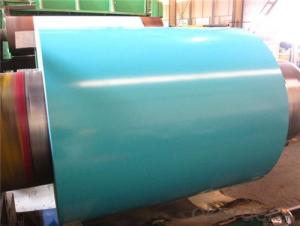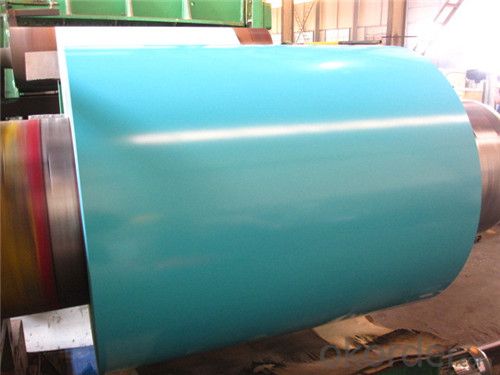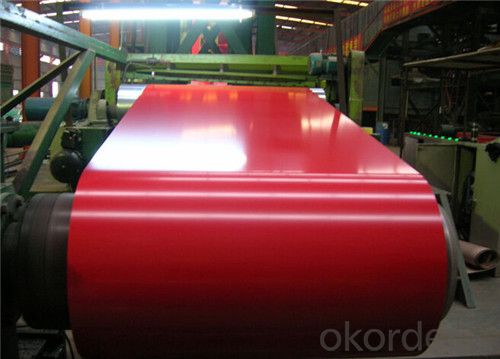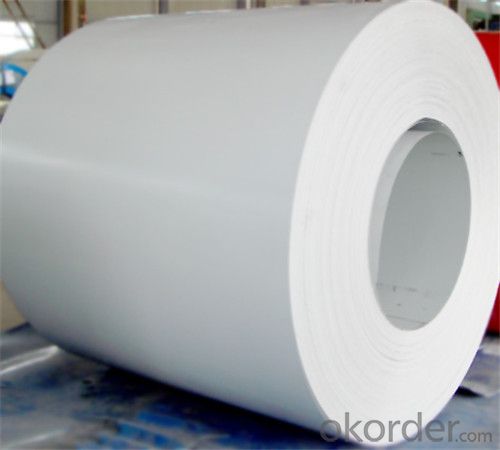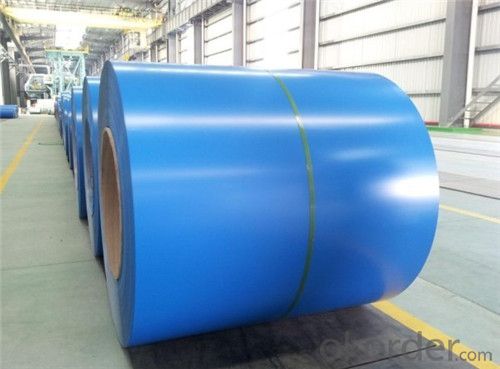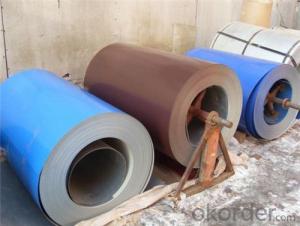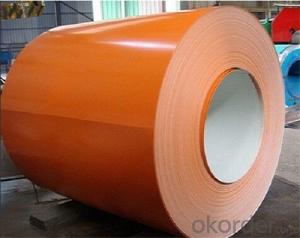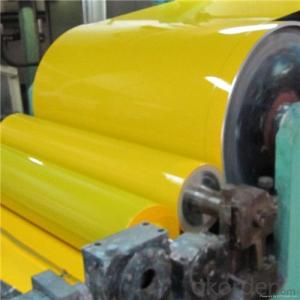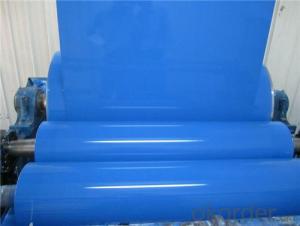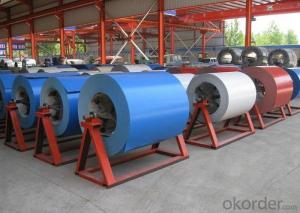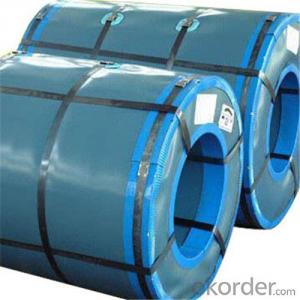Prepainted Rolled steel coil for Construction Roofing Constrution
- Loading Port:
- Shanghai
- Payment Terms:
- TT OR LC
- Min Order Qty:
- 50 m.t.
- Supply Capability:
- 30000 m.t./month
OKorder Service Pledge
OKorder Financial Service
You Might Also Like
Structure of Prepainted Rolled steel Coil for Construction Roofing
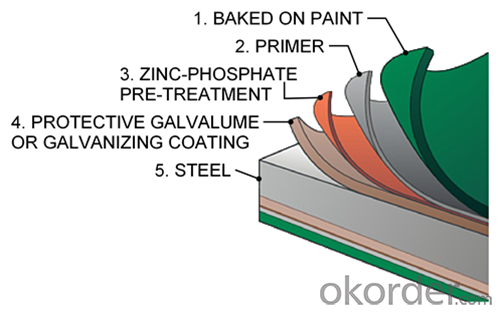
Description of Prepainted Rolled steel Coil for Construction Roofing
Prepainted Rolled steel Coil is a kind of coated steel coil/sheet. With the cold rolled steel of different strength and thickness as substrate, it is produced through applying Al-Zn coat on both faces by hot dip process. In its coating, Al accounts for about 55%, Si 1.6%, while the remaining is Zn. Aluminum zinc coils enjoys both the physical protective feature and durability of Al and the electrochemical protective property of Zn. And its surface has bright silver color and regular embossed-like figure, which are highly decorative.
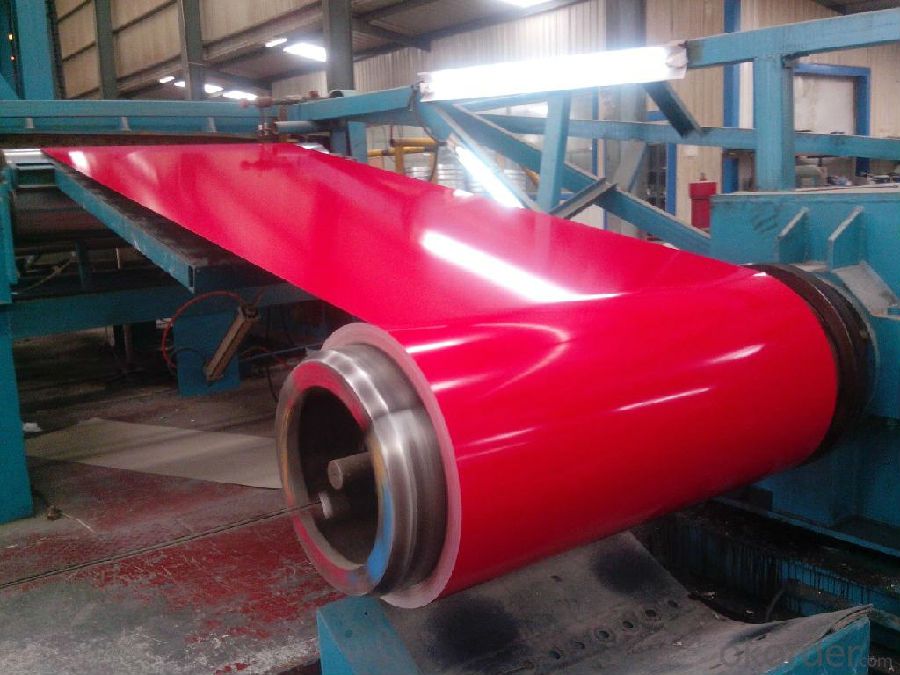
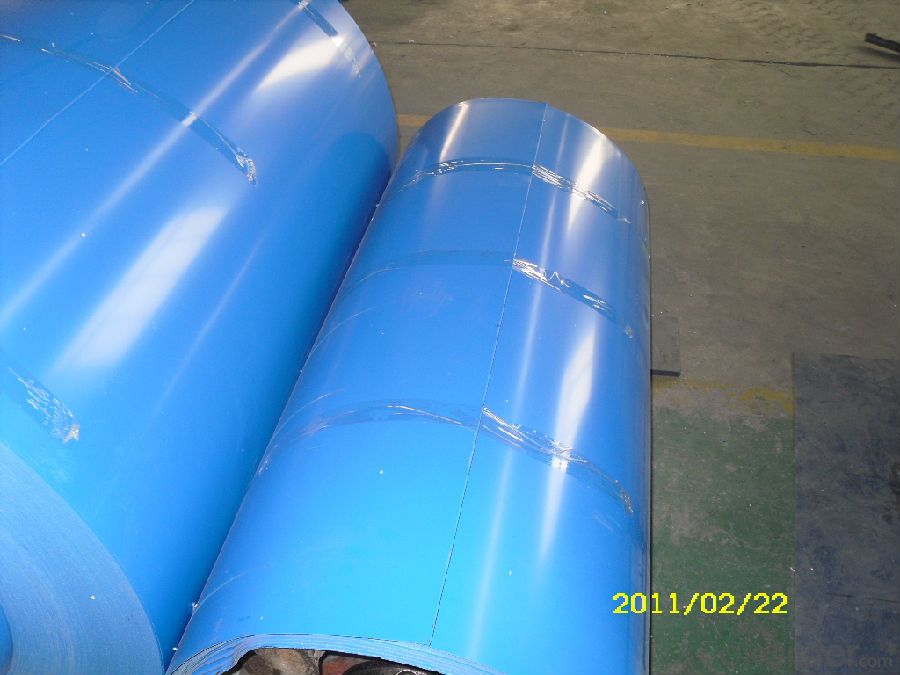
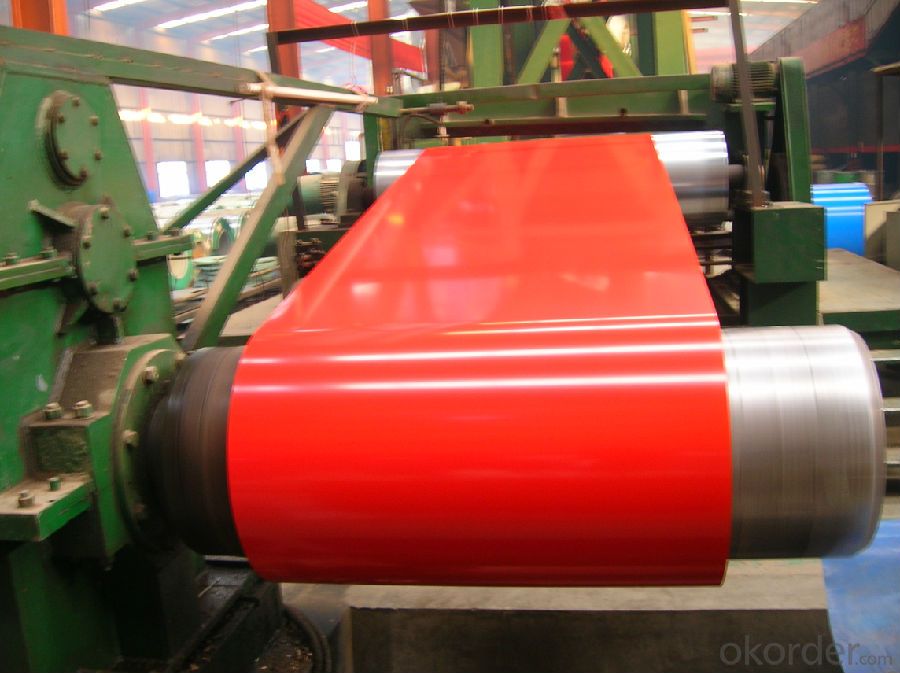
Main Feature of Prepainted Rolled steel Coil for Construction Roofing
1.Corrosion resistance: It mainly depends on the aluminum protection. When the zinc being worn, the aluminum will form a dense layer of aluminum oxide, resist corrosion material to prevent further corrosion inside.
2. Heat resistance: Aluminum zinc alloy steel sheet has excellent heat resistance, can withstand high temperatures over 300 centigrade, and is similar with aluminized steel high temperature oxidation resistance. It often used in chimney pipes, ovens, fluorescent lighting device and the device cover.
3. Heat reflective: Galvanized steel plate heat-reflective high rate is twice as galvanized steel, often used to make insulation materials.
4. Economy: Because density of 55% AL-Zn is smaller than the density of Zn, so in the same weight and thickness of Galvanized zinc layer, aluminum-zinc steel plate is larger area more than 3% of galvanized steel sheet.
Applications of Prepainted Rolled steel Coil for Construction Roofing
1. Construction and building: roofing; ventilating duct; handrail; partition panel;etc.
2. Electric appliance: refrigerator; washing machine; refrigerator; DVD;etc.
3.Transportation: oil tank; road sign; etc.
4.Agriculture:barn; etc.
5.Others:vending machine; game machine; etc.
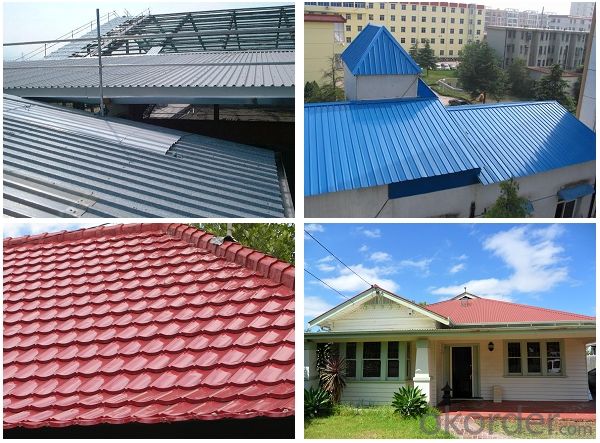
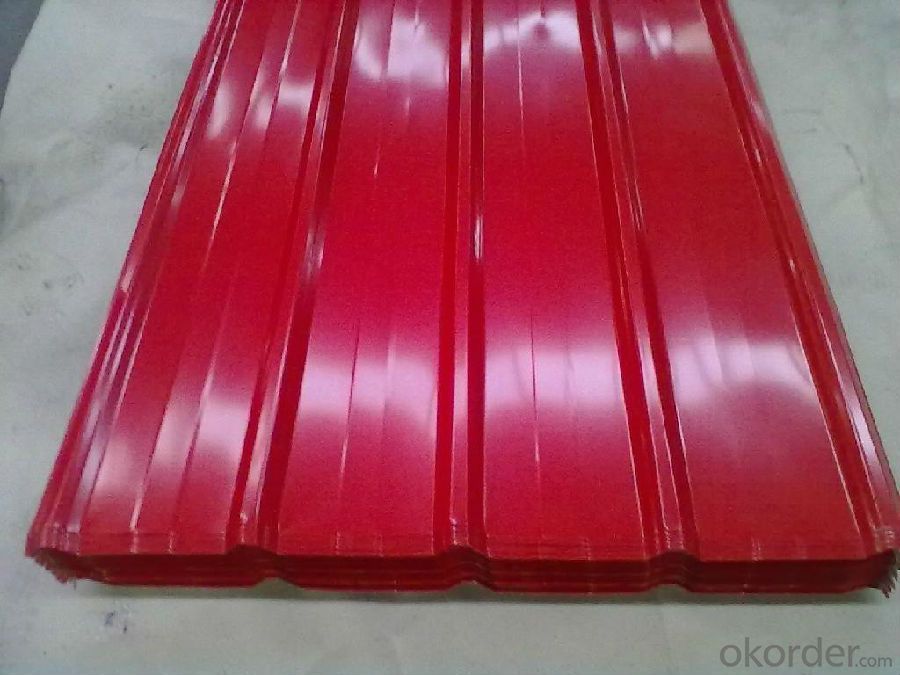
Specifications of Rolled steel Coil for Construction Roofing
Product | Prepainted Rolled steel Coil for Construction Roofing |
Material Grade | SGCC / SGCH / DX51D+AZ, etc |
Thickness | 0.2-3.0mm |
Width | 600-1500mm |
Tolerance | Thickness: +/-0.02mm , Width:+/-2mm |
Zinc-coating | AZ40-150g/m2 |
Technique | Raw material: Hot rolled steel coil --> Cold rolled_>hot dipped galvalume |
Surface | Dried, Chromated, Unoiled |
Spangle | Regular spangle , small spangle, zero spangle |
ID | 508MM |
Coil weight | 10MT max |
Export package | Cardboard inner sleeves, Waterproof paper, galvanized steel covered and steel strip packed |
FAQ of Prepainted Rolled steel Coil for Construction Roofing
We have organized several common questions for our clients,may help you sincerely:
1. What is the minimum order quantity ?
Our MOQ is 50mt for each size. And we will consider to give more discount if you make big order like 1000 tons and more. Further more, the more appropriate payment term your offer the better price we can provide.
2. How long can we receive the product after purchase?
Usually within thirty working days after receiving buyer’s advance payment or LC. We will arrange the factory manufacturing as soon as possible. The cargo readiness usually takes 15-25 days, but the shipment will depend on the vessel situation.
3. How to guarantee the quality of the products?
We have established the international advanced quality management system,every link from raw material to final product we have strict quality test;We resolutely put an end to unqualified products flowing into the market. At the same time, we will provide necessary follow-up service assurance.
- Q: How are steel coils used in the production of conveyor systems?
- Steel coils are used in the production of conveyor systems as they are formed into various components such as conveyor belts, pulleys, and rollers. These components provide strength, durability, and flexibility to the conveyor system, ensuring smooth movement of materials along the conveyor and enhancing its overall performance.
- Q: How much does a steel coil weigh?
- The weight of a steel coil can vary depending on its size, thickness, and type of steel used. On average, steel coils can weigh anywhere from a few hundred pounds to several tons.
- Q: Does anyone know anything about Kodiak Steel Homes?
- Steel framing replaces all the wood making the house stronger and resistant to termites. Costs about $2,000 more per house and there is a lack of trained framers in most cities. Never heard of Kodiak brand. Do you know a city where they are located?
- Q: How are steel coils used in the manufacturing of construction formwork?
- Steel coils are used in the manufacturing of construction formwork to create the framework and support structures needed for pouring concrete. The steel coils are typically shaped and cut into various sections to form the desired shape and size of the formwork. These coils provide strength, durability, and stability, ensuring that the formwork can withstand the weight and pressure of the concrete during the construction process.
- Q: Can steel coils be customized in terms of size and shape?
- Yes, steel coils can be customized in terms of size and shape. They can be manufactured to specific dimensions and configurations according to the requirements and specifications of the customer.
- Q: How are steel coils used in the production of roofing systems?
- Steel coils are used in the production of roofing systems in various ways. Firstly, the steel coils are unrolled and fed into a machine where they are cut to the desired length for the roofing panels. These coils are often made of galvanized steel, which is coated with a layer of zinc to protect against rust and corrosion. Once the coils are cut, they are then passed through a roll-forming machine. This machine shapes the steel into the required profile for the roofing panels. The shape of the panels can vary depending on the design and functionality of the roofing system. After the steel is formed, it may undergo further processes such as embossing or stamping to add texture or patterns to the panels. This helps to enhance the aesthetics of the roofing system and provide a unique look. The formed and processed steel panels are then coated with additional protective layers or finishes, such as paint or polymer coatings. These coatings further enhance the durability of the roofing system and provide resistance against weather elements, UV rays, and corrosion. The final step in the production of roofing systems involves the installation of the steel panels on the roof. The panels are typically fastened to the roof structure using screws or nails. The interlocking design of the panels ensures a secure and watertight installation, providing protection against leaks and moisture infiltration. Overall, steel coils play a crucial role in the production of roofing systems by providing a durable and long-lasting material that can withstand harsh environmental conditions. The versatility of steel allows for various design options and customization, making it a popular choice for roofing applications.
- Q: When steel is cast, does it become weaker/more brittle or anything of this nature? what are the side effects of steel casting on the steel itself?How can you correct these?
- Cast steel uses specific alloys of steel designed to improve the casting process. It has a specific strength and toughness range based on the alloying ingredients. It physical properties are a bit different from rolled steel. The primary problems with casting steel are porosity and voids or spaces where the mold is not completely filled with molten steel. These do not effect the basic strength of the steel but they can degrade the ability of the casting to function as designed.
- Q: It seems that steel would be stonger and more stable than wood, fire resistant, and better for the environment, so why are most homes wood-framed rather than steel-framed?
- Steel cost more and is very heavy. It would take a piece of equipment to put each piece in place. Holes would have to be made in the steel. Nails will not go into steel. How would the foundation be made?
- Q: Can steel coils be coated with zinc-nickel alloy?
- Yes, steel coils can be coated with a zinc-nickel alloy. Zinc-nickel alloy coating provides excellent corrosion resistance and is commonly used in various industries including automotive, construction, and manufacturing.
- Q: How are steel coils used in the manufacturing of doors and windows?
- Steel coils are used in the manufacturing of doors and windows as they provide the necessary strength and durability required for these products. The coils are first processed and shaped into the desired form, which is then used as the base material for constructing the frames and panels of doors and windows. The steel coils also undergo various treatments, such as galvanization or coating, to enhance their resistance to corrosion and weathering. Overall, steel coils play a crucial role in ensuring the structural integrity and longevity of doors and windows.
Send your message to us
Prepainted Rolled steel coil for Construction Roofing Constrution
- Loading Port:
- Shanghai
- Payment Terms:
- TT OR LC
- Min Order Qty:
- 50 m.t.
- Supply Capability:
- 30000 m.t./month
OKorder Service Pledge
OKorder Financial Service
Similar products
Hot products
Hot Searches
Related keywords
